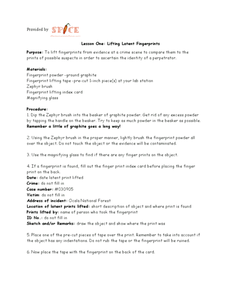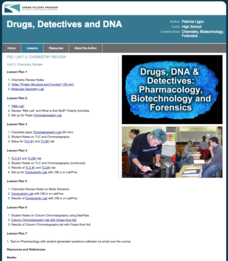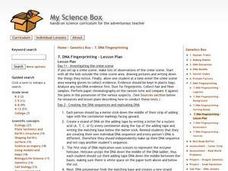Curated OER
Fingerprinting Lab
Students recover latent prints by iodine fuming, cyanoacrylate fuming, and dusting with powder, after a lecture/discussion on fingerprinting techniques. They each provide a fingerprint for identification by another student. A database of...
Kenan Fellows
Unit 4: The Brain
Drugs interact with the brain to alter moods, emotions, and behaviors by changing the brain's chemistry, perceptions, and interactions. The final lesson in the Pharmacology unit shows scholars experiments, has them complete four labs,...
Kenan Fellows
Unit 3: How Drugs Enter/Exit the Body
The third of a four-part series on Pharmacology teaches scholars how drugs enter and exit the body, how they act inside the body, how they affect the brain, and more. Over the course of the unit, groups complete two labs and one...
Curated OER
Mission Possible
Students, in teams, solve a crime using forensic lab techniques. They apply lab techniques to a real life situation using a crime scenario that takes place on campus. Sample activities include Blood, Fiber, and Hair Lab.
Curated OER
The Case of Similar Substances
Students perform tests in the lab to identify an unknown substance. In this physical science lesson, students observe the physical and chemical properties of substances. They formulate a conclusion based on experimental results.
Curated OER
Innocent or Guilty: A Lab on DNA Gel Electrophoresis
Students use the prelab as an introduction to the importance of DNA fingerprinting- a form of identification that us being accepted by both scientific and leagl experts. They prepare a gel for electrophoresis. DNA fragments, which have...
Frederick Moleski, Ph.D.
Blood Spatter: Bloodstain Analysis Experiments
It may be gruesome but somebody's got to do it! Young forensic scientists get a feel for what the job entails as they study blood spatter in seven experimental activites. They examine how spatter can be changed by release height,...
Curated OER
Flesh Eating Bugs, Moldy Corpses, The Trail of a Killer
Students read about how forensic entomologists use maggots to solve murders. In this forensic science lesson, students read an article and answer questions. They go to different websites about evidence and fingerprinting.
Curated OER
DNA AND BLOOD TYPING
Students list three descriptive characteristics and three functions of DNA, describe two ways that genetics is important in a forensic investigation, and list the four major human blood types.
Curated OER
Blood Analysis
Students reconstruct a crime scene to produce the blood spatter pattern. In this forensic science lesson, students describe the events that lead to produce such patterns. They explain the importance of blood analysis in solving crimes.
Curated OER
Applied Science - Science and Math Lab
Students examine fabric. For this Applied Science lesson, students look at the fibers of fabric through a microscope. Students compare and contrast a variety of fibers.
Curated OER
Fiber Identification
Lab sheets for three different crime scene investigation activities are tucked into this resource. In the first activity, inquisitors examine a variety of fibers, including the fiber found at "the crime scene," under ultraviolet light....
Curated OER
Lesson One: Lifting Latent Fingerprints
Crime scene investigators practice collecting fingerprints off of surfaces in order to compare them to an imaginary crime suspect's prints. Instructions for using graphite powder and a Zephyr brush to collect the evidence are outlined....
Curated OER
Audio Engineers: Sound Weavers
Students explore audio engineering. In this career education and "sound" science lesson, students define related vocabulary and make connections between the music they listen to and the job an audio engineer does after listening to...
Curated OER
DNA Fingerprinting Simulation
In this DNA fingerprinting simulation worksheet, students perform an activity that represents using a gel electrophoresis. Students decide who commits a crime in a forensics style lab.
Kenan Fellows
Unit 2: Chemistry Review
What exactly goes into the medications people take every day? Scholars learn about the chemistry of medications in the second of a four-part series on Pharmacology. Over the course of two weeks, class members complete seven experiments,...
Curated OER
DNA Fingerprints
Students interpret different DNA fingerprints, then do a jigsaw activity to explore other uses of DNA forensics. They listen to a radio program about using DNA as evidence and discuss the limitations of and problems with DNA testing.
Curated OER
Biotechnology: Drug Delivery and Diffusion
Students discover advances in biomedical technology such as transdermal delivery and other non-invasive procedures. In lab activities, they examine how medication is given and how molecules travel, observe electrophoresis, and conduct...
Curated OER
DNA Fingerprinting
Students study the process of DNA Fingerprinting and how DNA Fingerprinting is used in solving crimes. They examine a crime scenario that involves collecting DNA Fingerprinting information from blood collected at the crime scene. They...
Curated OER
Toolmarks Lesson Plan
Learners examine the scientific method and lab procedures. They solve problems using experimentation, observation, and the scientific method.
Curated OER
DNA
Students explore the basics of DNA and its history. In this DNA lesson students extract DNA from fruits and understand how it is used in forensics.
Curated OER
Using Plant Pigments to Link a Suspect to a Crime
Students use chromatography to separate plant pigments collected from a fictitious crime scene and suspects. They compare the Rf values of the plant pigments to determine whether the plant pigments found on any of the suspects match the...
Curated OER
Bloodstain Pattern Simulations: A Physical Analysis
Students receive bloodstain pattern evidence from a crime scene. They answer a series of questions through inquiry, observation, measurement, and analysis. Pupils complete this challenge, by reconstructing the evidence through four...
Curated OER
Fingerprinting
Students list and describe the three types of fingerprint patterns. They list and describe three layers of fingerprints that can be made. They explain why we leave fingerprints.

























